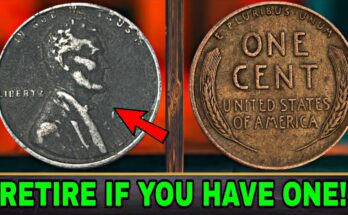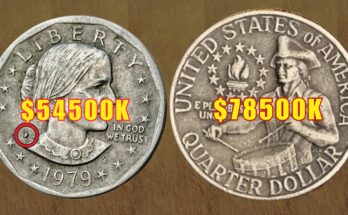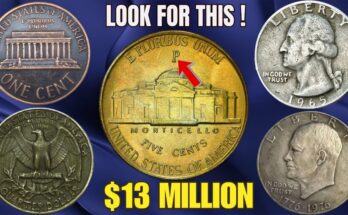we uncover the hidden treasures of the Lincoln Wheat Penny—one of America’s most beloved coins. Minted from 1909 to 1958, these pennies are packed with history, and while many are common, rare dates, mintmarks, and errors can be worth a fortune.
Ready to hunt for six-figure pennies? Let’s dive in!

Key Dates & Mintmarks That Make Wheat Pennies Valuable
| Mint | Example (1940 Mintage) | Circulated Value | Uncirculated Value |
|---|---|---|---|
| Philadelphia (No mintmark) | 291,070,000 | $0.10 – $0.25 | $1.00 – $5.00 |
| Denver (D) | 112,024,000 | $0.15 – $0.50 | $1.50 – $7.50 |
| San Francisco (S) | 81,770,000 | $0.20 – $0.75 | $2.00 – $10.00 |
The Most Valuable Wheat Penny Varieties
| Variety | Why It’s Rare | Value (Certified) |
|---|---|---|
| 1909-S VDB | First year, tiny “VDB” initials, low mintage | $700 – $10,000+ |
| 1914-D | One of the rarest Denver issues | $200 – $5,000+ |
| 1922-D (Plain) | Weak or missing “D” mintmark | $500 – $10,000+ |
| 1931-S | Lowest mintage regular Wheat Penny | $75 – $1,500+ |
| 1943 Copper | WWII error (should be steel) | $60,000 – $400,000+ |
| 1944 Steel | Rare steel planchet mistake | $75,000 – $125,000+ |
| 1955 Doubled Die | Famous dramatic doubling | $1,000 – $285,000+ |
How to Spot a Rare Wheat Penny
1. Check the Date & Mintmark
- Date: Below Lincoln’s bust (front).
- Mintmark: Below the date—“D” (Denver) or “S” (San Francisco). No mintmark = Philadelphia.
2. The Legendary 1909-S VDB
- Look for “VDB” (designer’s initials) under the reverse lettering.
- Only 484,000 minted—extremely rare in good condition.
3. The 1943 Copper & 1944 Steel Errors
- 1943 Copper: Should be steel (gray & magnetic). If it’s copper-colored and non-magnetic, it’s a fortune.
- 1944 Steel: Should be copper (bronze). If it’s silver & magnetic, it’s a rare error.
4. Doubled Die Varieties (Like the 1955 DDO)
- Use a 10x magnifier—look for clear doubling in the date and “LIBERTY.”
- Avoid machine doubling (smeared, not raised).
5. The 1922 “No D” Penny
- Denver Mint accidentally struck some without a “D.”
- Faint traces or missing mintmark? Could be worth thousands.
Grading & Value Guide
Condition is everything—here’s how it affects value:
| Grade | Description | Value Multiplier (Rare Coins) |
|---|---|---|
| Good (G-4) | Heavy wear, faint details | 1x |
| Fine (F-12) | Moderate wear, clear major details | 2-5x |
| Very Fine (VF-20) | Significant wear, sharp details | 5-10x |
| Extremely Fine (XF-40) | Light wear, strong details | 10-20x |
| About Uncirculated (AU-50) | Slight wear, partial luster | 20-50x |
| Mint State (MS-60+) | No wear, full luster | 50-1000x+ |
Where to Find Valuable Wheat Pennies
- Estate Sales & Old Collections (untouched treasures)
- Coin Dealers & Shows (experts can help spot rarities)
- Online Auctions (eBay, Heritage, but verify authenticity!)
- Bank Rolls (Rare but possible!)
If You Find a Rare One:
✅ Don’t clean it! (Ruins value)
✅ Use a magnet & scale (1943 Copper won’t stick, 1944 Steel will)
✅ Compare with PCGS/NGC examples (www.PCGS.com/coinfacts)
✅ Get it graded (PCGS or NGC certification = higher value)
2024 Market Trends
📈 Key dates & errors still rising in value
💰 High-grade (MS-65+) coins selling for record prices
🛡️ Certified coins (PCGS/NGC) dominate the market
🌐 Online auctions driving demand for rare finds
Join the PennyVerse Wheat Penny Community!
🔍 Get exclusive perks:
✔ Free weekly error coin alerts
✔ Live video grading sessions
✔ Access to our rarity database
✔ Members-only buying opportunities



Leave a Reply